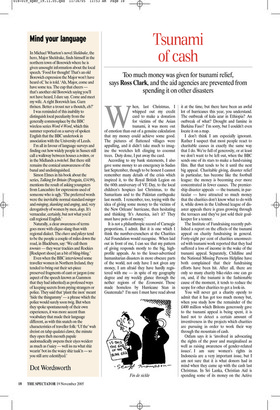Mind your language
In Michael Wharton’s novel Sheldrake, the hero, Major Sheldrake, finds himself in the northern town of Borewich where he is given unsought information about the local speech. ‘Food for thought! That’s an old Borewich expression the Major won’t have heard of,’ he is told. ‘Ah, Major, come and have some tea. The cup that cheers — that’s another old Borewich saying you’ll not have heard, I dare say. Come and meet my wife. A right Borewich lass. Garn thrixen. Better a troust ner a thoutch, eh?’ I was reminded of this inability to distinguish local peculiarity from the generally commonplace by the BBC wireless series Word 4 Word, which this summer reported on a survey of spoken English that the BBC undertook in association with the University of Leeds.
I’m all in favour of language surveys and finding out how widely people in Sussex still call a walkway between houses a twitten, or in the Midlands a twitchel. But there still remains the comical unawareness of the banal and undistinguished.
Simon Elmes in his book about the series, Talking for Britain (Penguin, £14.99), mentions the result of asking youngsters from Lancashire for expressions used of someone who is ugly. ‘The preferred words were the inevitable normal standard minger and minging, skanking and anging, and, very derogatively of women by men, dogs. It’s vernacular, certainly, but not what you’d call regional English.’ Naturally, a clear awareness of terms goes more with clique-slang than with regional dialect. The chavs and pikeys tend to be the people a couple of miles down the road, in Blackburn, say: ‘We call them townies — they wear trackies and Rockies [Rockport shoes] an a bit of bling-bling.’ Even when the BBC interviewed some traveller women in Northern Ireland, they tended to bring out their set-piece preserved fragments of cant or jargon (one aspect of the speech known as Gammon that they had inherited) as professed ways of keeping secrets from prying strangers or police. They said that ‘plant the inox’ meant ‘hide the thingummy’ — a phrase which the police would surely soon twig. But when they spoke spontaneously of their own experiences, it was more accent than vocabulary that made their language different, as with this snatch on the characteristics of traveller folk: ‘Uf the’ wuh dreisst en tahp qualatei clawz, the minute they open theh meouth papale audomadically awpens their eiyes weiderr as much as t’saiey — well iss na what shiz wearin’ bot iss the waiey shiz taak’n — so you still arre edentifyed.’
Dot Wordsworth

























































 Previous page
Previous page